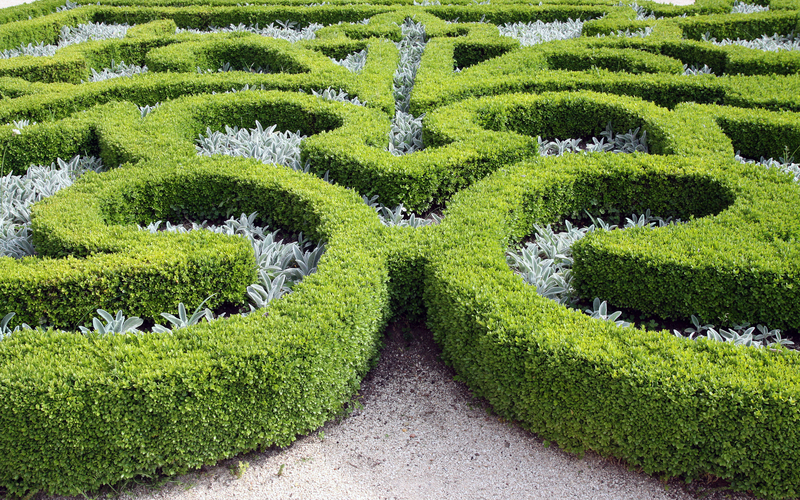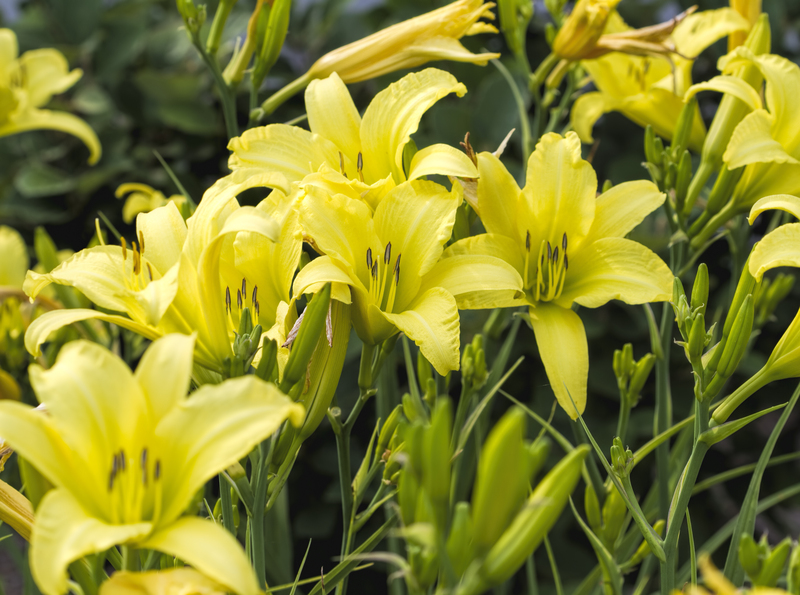Innovative Zen garden ideas for peaceful outdoor spaces
Posted on 19/09/2025
Innovative Zen Garden Ideas for Peaceful Outdoor Spaces
In an increasingly hectic world, the serenity of a Zen garden offers a profound sense of peace. These traditional Japanese spaces have evolved over centuries and are now tailored for modern lifestyles, blending classic principles with fresh, creative design. This comprehensive guide explores innovative Zen garden ideas that can transform any yard, patio, or balcony into a tranquil retreat, whether you have acres or a compact urban nook.

Understanding Zen Gardens: More Than Just Rocks and Sand
Zen gardens, or karesansui, are minimalist landscapes that evoke the spirit of nature through carefully arranged rocks, gravel, sand, and select plants. Historically, these gardens were designed for contemplation, usually as part of Buddhist temples. Modern approaches adapt Zen garden concepts to suit diverse climates, lifestyles, and aesthetics, embracing new forms without sacrificing tranquility.
Core Elements of a Zen Garden
- Rocks and Stones: Represent mountains, islands, or animals; focal points for meditation.
- Gravel or Sand: Raked into patterns that mimic water or clouds, symbolizing movement or stillness.
- Water Features: Real or implied (with stones or raked sand); adds a sense of calm and reflection.
- Minimalist Planting: Carefully chosen greenery suggests seasons and emphasizes simplicity.
- Natural Materials: Bamboo, wood, and stone for structures, fences, or bridges.
Modern Interpretations: Innovative Zen Garden Design Ideas
1. Urban Zen: Small-Scale Serenity
Don't have a traditional yard? Even balconies and rooftops can host innovative Zen-inspired gardens. Try these approaches:
- Tabletop Zen Gardens: Miniature trays with sand, pebbles, and a few stones; perfect for apartments or office desks. Rake patterns daily for mindfulness.
- Vertical Gardens: Install simple vertical plant walls using calming evergreen clumps like moss, ferns, or bamboo. Add stone features for authenticity.
- Potted Simplicity: Use larger pots with single elements such as a sculptural stone, dwarf pine, or Japanese maple to infuse Zen essence into tight spots.
2. Fusion Zen: Mixing Modern Materials
Contemporary architecture calls for creative landscaping. Why not blend classic Japanese Zen garden ideas with modern materials?
- Concrete & Metal: Sleek, weathered steel or concrete borders help frame gravel beds or stone groupings, adding geometric order and visual contrast.
- Glass Accents: Strategically placed glass panels reflect natural light, enhancing the garden's ethereal feel, especially at dusk.
- Recycled Elements: Repurpose old bricks, pavers, or even mirrors to craft pathways or focal features with a sustainable touch.
3. Water Wonders: Innovative Aqua Elements
Although traditional Zen gardens often symbolize water with sand or gravel, modern designs embrace real aquatic features for heightened tranquility and sensory appeal.
- Reflecting Pools: Shallow, clear ponds mirror the sky and landscape, helping amplify stillness. A single stepping-stone path can invite mindful walking.
- Bubbling Water Basins: Simple electric or solar bubblers in stone or ceramic urns evoke the sound of running water, a proven stress-reliever.
- Dry Riverbeds: Create implied watercourses with artfully placed pebbles or river stones snaking through the garden, leading the eye and the imagination.
Transforming Your Space: Creative Zen Garden Ideas for Every Setting
4. Natural Zen: Embrace Native Plants
While Japanese plants like azaleas, maples, and bamboo reign supreme in traditional Zen gardens, innovative designs can celebrate local flora for a sustainable, low-maintenance landscape.
- Evergreen Structure: Use sculptural, slow-growing natives -- such as juniper, pine, or yew -- to provide year-round interest and anchor the space.
- Groundcovers: Moss, creeping thyme, or mondo grass create a lush, soothing carpet. Choose varieties suited to your climate for best results.
- Seasonal Blooms: Integrate a subtle palette of perennial flowers, echoing cherry blossom time or camellia in spring for a gentle touch of color.
5. Artistic Zen: Sculptures and Installations
Express your style with artful elements that complement the garden's tranquility.
- Sculptural Stones: Place a few uniquely shaped boulders as focal points. These can symbolize animals, mountains, or abstract concepts.
- Modern Art Pieces: Consider minimalist weathered steel sculptures or driftwood assemblies to create visual tension without overwhelming the serenity.
- Lanterns and Pagodas: Incorporate subtle solar garden lights or traditional stone lanterns to provide gentle illumination and indicate sacred spots.
6. Seasonal Zen: Gardens that Evolve All Year
Plan for interest in every season with clever plant combinations and design features:
- Winter Bones: Pruned evergreens, boulders, and raked gravel offer sculptural beauty, even under snow or frost.
- Spring Awakening: Add bulbs or ornamental cherries for early blooms that signal renewal.
- Summer Shade: Deploy bamboo screens, small maples, or pergolas for dappled relief.
- Autumn Accents: Japanese maples, burning bush, or red grasses create fiery contrasts as leaves change color in the fall.
Creating a Sense of Flow: The Art of Layout in Zen Garden Design
The essence of a truly peaceful outdoor Zen space lies in thoughtful layout. Use winding paths, stepping stones, and balance to encourage slow movement and discovery.
7. Meandering Paths and Bridges
- Curved Pathways: Gentle curves invite exploration and slow the pace; use gravel, flagstones, or wood planks.
- Mossy Stepping Stones: Flat stones set into velvety moss feel soft underfoot and invite mindfulness.
- Arched Bamboo Bridges: Even small bridges over dry riverbeds serve as metaphors for transition and crossing into new states of awareness.
8. Defined Tranquility Zones
- Contemplation Nooks: Screen off a quiet corner with bamboo fencing or raised planters; install a simple bench or meditation stool.
- Living Screens: Use tall grasses or clipped hedges to create a sense of seclusion without fencing in the entire garden.
- Layered Views: Arrange elements so that each step reveals something new: a stone lantern partially hidden, a glimpse of a water bowl, or the arching limb of a tree.
Essential Materials and Tools for Innovative Zen Gardens
Building a modern Zen-inspired garden doesn't require a huge budget or advanced skills, but a few carefully chosen materials and tools are essential. Mixing local and traditional materials keeps costs in check and supports sustainability.
- Sand and gravel: Choose pale, fine sand for raking, or pebbles in calm shades of gray, silver, or white.
- Natural stone: Collect local granite or river rocks for authenticity, or purchase sculptural stones from a landscaping supplier.
- Bamboo: Use for fencing, screens, bridges, or water spouts; it's fast-growing and sustainable.
- Wood: Weather-resistant hardwoods like cedar or teak for benches or decks.
- Simple tools: A sand rake (or a hand-crafted wooden version), pruning shears, bucket, and shovel are enough for most projects.
Tips for Maintaining a Serene Zen Garden
Once you've created your peaceful Zen garden, staying on top of maintenance is important for preserving the intended sense of order and tranquility.
- Regular Raking: Smooth and re-pattern sand or gravel weekly; this is meditative and keeps the design sharp.
- Weeding: Stay vigilant in gravel and among stones.
- Pruning: Clip evergreens and trees to sculpt their form and control growth.
- Water features: Clean pumps and basins regularly to avoid algae or mechanical issues.
- Seasonal refresh: Adjust plantings and features in spring and fall for ideal visual balance.

Frequently Asked Questions about Zen-Inspired Gardens
What makes a Zen garden unique among outdoor landscapes?
A Zen garden is unique for its focus on minimalism, contemplation, and symbolism. The careful arrangement of simple, natural elements encourages a sense of peace, stillness, and mindfulness.
Can I build a Zen garden in a small space?
Absolutely! Compact Zen gardens are ideal for urban courtyards, balconies, or even windowsills. Focus on minimal, well-chosen elements, such as a sand tray, a single boulder, or a lush potted plant.
Is maintenance difficult for innovative Zen gardens?
Maintenance is usually easy and often meditative. Raking gravel, pruning plants, and keeping the space tidy are simple, rewarding tasks that enhance the sense of calm and intention in your space.
What plants should I choose for low-maintenance Zen garden ideas?
For low-maintenance Zen gardens, choose evergreens, mosses, ornamental grasses, and native shrubs that require less water and pruning. Local species are often the best choice for both sustainability and ease of care.
Final Thoughts: Cultivating Peaceful Outdoor Spaces with Innovative Zen Garden Designs
Integrating modern Zen garden ideas into your yard -- whether it's sprawling or small -- transforms outdoor spaces into sanctuaries of calm and beauty. By blending classic principles with new materials, native plants, and creative layouts, your outdoor Zen sanctuary can become a refuge for relaxation and inspiration for years to come.
Remember, a Zen garden is less about following strict rules and more about cultivating intention, simplicity, and harmony with nature. Begin with a few meaningful elements and allow your garden to evolve; over time, you'll discover new ways to nurture peace and creativity not only in your landscape -- but also in your life.
Latest Posts
Discover the Joy of Container Gardening
Innovative Zen garden ideas for peaceful outdoor spaces
Transforming Your Yard into a Kid-Friendly Haven
Transforming Your Garden with Beautiful Seating Arrangements

